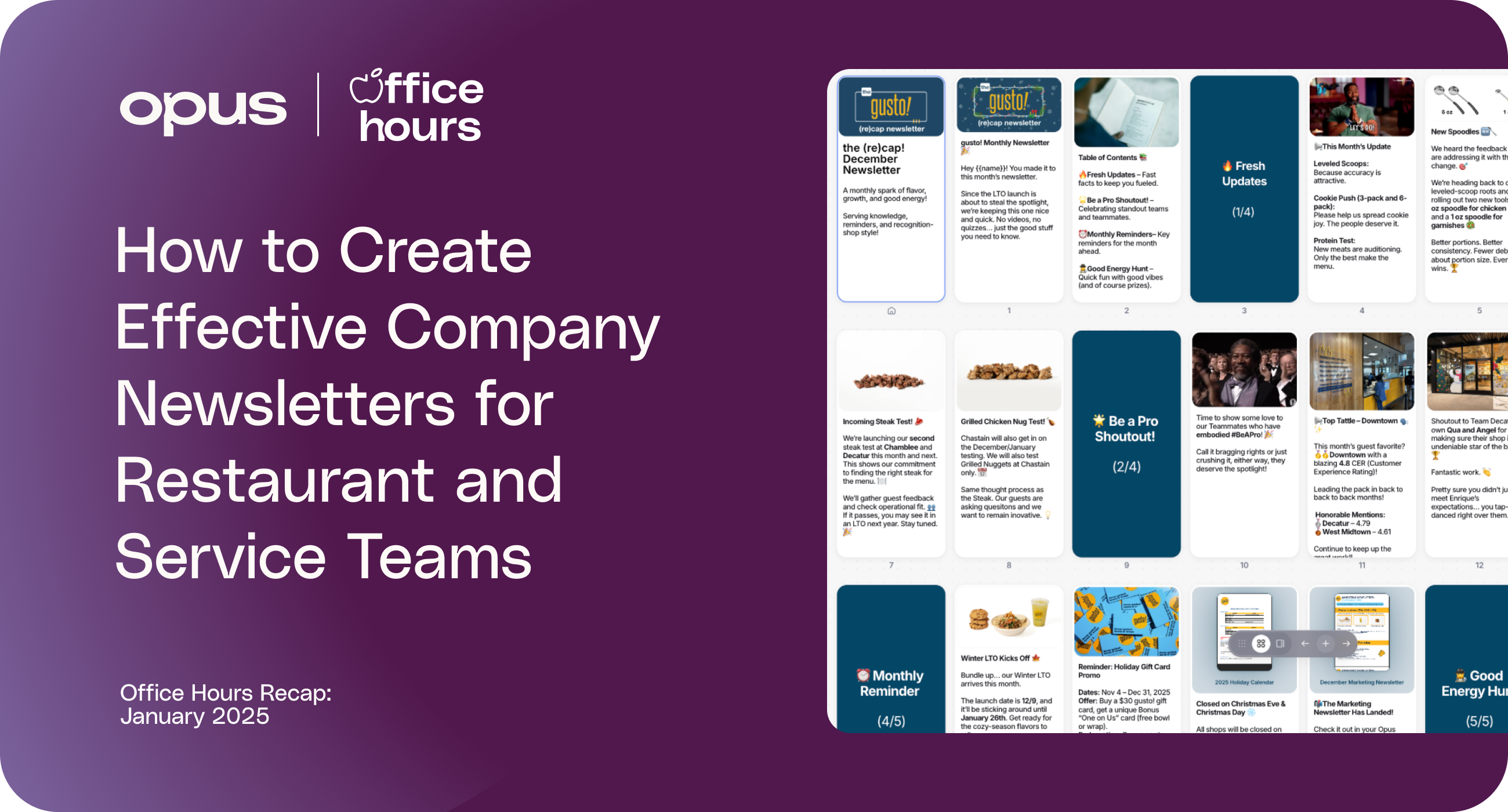A full-service restaurant has a variety of staff roles that work together to ensure smooth operations. These roles can be broadly categorized into front-of-house, back-of-house, management, and specialized positions.
With such diverse employee roles comes the need to tailor training for the specific needs and responsibilities of each role. Whether it's training front-of-house staff on customer interaction or back-of-house staff on food safety protocols, a customized approach ensures that each team member is equipped to perform their job effectively.
Topics every restaurant employee training should include
There are fundamental aspects of working in the restaurant industry that every employee should learn from day one. Here are a few important topics:
- About the company: Every employee training should include detailed information about the restaurant business, its history, mission, and goals. This will help employees to understand the organization they are working for and feel more connected to their job.
- Company culture and values: Introducing employees to the company culture and values is essential for creating a positive work environment. Employees should understand the core values that guide decision-making and behavior within the organization.
- HR onboarding: Proper HR onboarding helps new hires become familiar with company policies, procedures, and benefits. This will help them integrate smoothly into the organization and feel supported in their new role.
- General safety: Employee safety should always be a top priority in any workplace. Training on general safety protocols and procedures can help prevent accidents and injuries on the job.
- Product and menu information: Training should include detailed information about the product and menu items. This will help restaurant employees provide better customer service and be more knowledgeable about the restaurant's offerings.
💡When creating role-specific training, it’s a great idea to create short courses on specific topics. Then, you can mix and match these programs for each role based on the needs of the role.
Front-of-house staff
From the moment patrons step through the door until they leave satisfied, front-of-house employees interact directly with customers. Customer service is a top priority and the training methods for it change based on the customer expectations during a certain touch point. For instance, a food runner might need to practice customer service skills in a different way from a hostess. Some situations lend themselves well to role playing, while others are suitable for online training.
Let's dive into the responsibilities and training requirements for each front-of-house role:
1. Bartenders
Behind the bar, bartenders are trained in cocktail recipes, mixology techniques, and responsible alcohol service. Working efficiently, keeping a clean space, and engaging customers are key for strong bartender employees.
2. Bussers
Supporting the front-of-house team, bussers are trained in table bussing, dish clearing, and maintaining restaurant cleanliness standards. Teamwork, attention to detail, and time management skills help keep operations smooth during busy service periods.
3. Food runners
Charged with delivering dishes from the kitchen to the table, food runners receive training on food presentation standards, order accuracy, and timing. Effective food runners communicate well with the kitchen staff and have good attention to detail.
4. Hosts/hostesses
Responsible for managing reservations, seating arrangements, and providing the initial welcoming experience for guests, hosts, and hostesses require training in reservation systems, seating protocols, and effective communication skills. Creating a warm and inviting atmosphere sets the tone for the entire dining experience. Multitasking is also essential for juggling the various tasks involved with being a host or hostess.
5. Servers
As the primary point of contact for guests, servers undergo comprehensive training on various aspects of customer service. This includes mastering menu knowledge, understanding food and beverage pairing, and honing essential customer interaction skills. Role-playing scenarios can be helpful to practice greeting guests, taking orders accurately, and effectively handling customer inquiries and complaints.
💡You don’t have to start from scratch with every course. Pre-built templates are a great starting point for more generic skills training. Check out Opus’ 100+ course, fully editable templates.
Back-of-house staff
Back-of-house staff forms the backbone of any restaurant operation, working diligently behind the scenes to ensure that dishes are prepared to perfection and delivered to customers on time. Let's explore the skills and training required for various kitchen roles:
6. Chefs
At the helm of the kitchen, chefs undergo extensive training on cooking techniques, recipe execution, and kitchen safety protocols. Their training includes hands-on experience in food preparation, plating, and maintaining quality control standards to deliver exceptional culinary creations.
7. Dishwashers
Although often overlooked, dishwashers play a crucial role in maintaining kitchen cleanliness and ensuring smooth operations. Training includes operating dishwashing equipment, following sanitation procedures, and maintaining kitchen hygiene standards. Dishwashers are trained to work efficiently, pay attention to detail, and collaborate closely with kitchen staff to keep the flow of dishes moving seamlessly.
8. Line cooks
Responsible for executing dishes during service, line cooks receive training on station setup, mise en place, and strict adherence to recipe specifications. Training on speed, accuracy, and teamwork are necessary to handle the fast-paced demands of peak service hours effectively.
9. Prep cooks
Prep cooks undergo training focused on ingredient preparation, knife skills, and recipe scaling. While organization and efficiency are necessary, even more important is strict adherence to food safety standards.
10. Sous chefs
Assisting the head chef, sous chefs receive training in kitchen management, inventory control, and leadership skills. Their training encompasses menu planning, recipe development, and overseeing kitchen operations to ensure efficiency and quality standards are met.
Restaurant management and supervisory staff
Restaurants can empower their management staff to effectively lead teams and drive performance with the right training. Let's delve into the leadership skills and managerial responsibilities essential for supervisory roles:
11. Training managers
Tasked with facilitating employee training and development, training managers receive training on instructional design, training delivery, and assessment techniques. Their training emphasizes creating engaging training materials, facilitating interactive sessions, and evaluating employee performance to ensure effective skill development across the team.
12. Shift leaders
Responsible for overseeing specific shifts, shift leaders undergo training on shift management, employee scheduling, and customer interaction. Role-playing scenarios often help prepare shift leaders to effectively lead their teams during busy service periods.
13. Assistant managers
Assistant managers receive training on operational procedures, restaurant staff supervision, and customer service standards. Their training focuses on delegation, time management, and employing effective employee coaching techniques to foster team productivity and morale.
14. Restaurant managers
At the forefront of leadership, restaurant managers undergo training on principles of leadership, team management, and financial accountability. Their training emphasizes problem-solving, decision-making, and conflict resolution skills to effectively navigate restaurant management challenges.
15. General managers and regional managers
These high-level management roles often involve personalized and on-the-job training tailored to the specific needs and responsibilities of the position. Professional coaching with trainers and consultants can further develop managerial skills.
Specialized roles
Whether your restaurant is hosting special events, or offers catering services, specialized training may be required for these specific roles. Let's explore some key considerations for training specialized roles:
16. Sommeliers
For establishments offering wine service, sommeliers play a crucial role in guiding guests through the wine selection process. Training encompasses wine knowledge and wine service techniques. Role-playing with wine tasting sessions helps sommeliers refine their expertise in wine pairing principles and work on the delivery of wine recommendations.
17. Catering staff
Catering staff are responsible for executing catering orders, ensuring food presentation meets quality standards, and effectively communicating with clients. Training for catering staff typically covers catering procedures, food presentation techniques, and client communication skills. Training emphasizes attention to detail, time management, and flexibility to adapt to the unique demands of catering environments.
18. Event coordinators
Event coordinators plan, organize, and execute special events within the restaurant. Their training typically includes instruction on event planning, coordination, and customer relationship management. Restaurants often provide hands-on training to familiarize event coordinators with managing logistics and ensuring guest satisfaction for special occasions.
19. Food and beverage manager
Food and beverage managers oversee the restaurant's food and beverage operations, including menu development and inventory management. Their training may include forecasting food needs, working closely with chefs to develop menu items, and ensuring compliance with dietary restrictions and allergen considerations.
Cross-training and career development for restaurant employees
Restaurants and employees will benefit from cross-training and career development. When employees are familiar with various tasks and responsibilities, they can seamlessly transition between tasks as needed to address unexpected staffing shortages, fluctuating customer demand, or specialized events. This flexibility helps restaurants maintain smooth operations and deliver consistent service levels, even during challenging circumstances.
Ongoing training and mentorship programs also boost employee satisfaction. They empower employees to expand their knowledge and acquire new skills, whether it's mastering new culinary techniques, honing leadership skills, or transitioning into management roles. Creating a culture of continuous learning and providing clear pathways for advancement can help you attract and retain top talent.
Embrace diverse training methods
Restaurants are embracing a blended approach to training, with online learning and in-person training. These methods often include a mix of the following:

- Video tutorials to demonstrate tasks, procedures, and best practices
- Peer mentoring to provide guidance and support
- Gamification to make learning engaging and interactive
- Role-playing to provide hands-on practice to reinforce learning and build confidence
- Microtraining to deliver efficient bite-sized learning experiences
- Adaptive learning to cater to the individual needs and progress of each employee
- Artificial intelligence to personalize training content, analyze performance data, and enhance the effectiveness of restaurant training initiatives
- Augmented reality and virtual reality technologies to simulate real-world restaurant scenarios
See the top trends that L&D leaders are embracing in the Hospitality Training 360 report. The diverse roles within a restaurant—from front-of-house to back-of-house, management, and specialized positions—all require tailored training approaches to set restaurant employees up for success. Creating training programs doesn't have to be cumbersome, and it's not when you build module-based online training programs.






